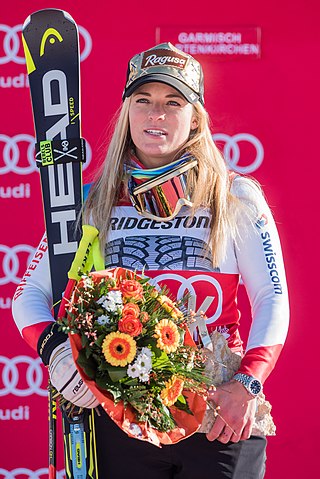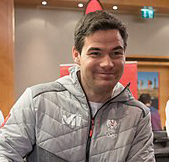
The 48th World Cup season began on 26 October 2013, in Sölden, Austria, and concluded on 16 March 2014 at the World Cup finals in Lenzerheide, Switzerland. The defending overall champions from the 2013 season were Marcel Hirscher of Austria and Tina Maze of Slovenia. The overall titles were won by Hirscher and Anna Fenninger, also of Austria. The season was interrupted by the 2014 Winter Olympics that took place from 7 to 23 February in Sochi, Russia, with the alpine events at Rosa Khutor.

The 49th World Cup season began on 25 October 2014, in Sölden, Austria, and concluded on 22 March 2015 at the World Cup finals in Meribel, France. The defending overall champions from the 2014 season - Marcel Hirscher and Anna Fenninger, both of Austria, defended their titles successfully. The season was interrupted by the World Championships in February, in the United States at Vail/Beaver Creek, Colorado. Combined events were not awarded as a discipline trophy.

The International Ski Federation (FIS) Alpine Ski World Cup was the premier circuit for alpine skiing competition. The inaugural season launched in January 1967, and the 2017–18 season marked the 52nd consecutive year for the FIS World Cup.

The International Ski Federation (FIS) Alpine Ski World Cup was the premier circuit for alpine skiing competition. The inaugural season launched in January 1967, and the 2018–19 season marks the 53rd consecutive year for the FIS World Cup.

The International Ski Federation (FIS) Alpine Ski World Cup, the premier circuit for alpine skiing competition, began in January 1967, and the 2019–20 season marked the 54th consecutive year for the FIS World Cup. As it had every year since 2006, the season began in Sölden, Austria in October. The season was supposed to end with the World Cup finals in March, which were to be held in Cortina d'Ampezzo, Italy for the first time since they began in 1993, but the finals were cancelled due to the COVID-19 outbreak in Italy.

The International Ski Federation (FIS) Alpine Ski World Cup was the premier circuit for alpine skiing competition. The inaugural season launched in January 1967, and the 2020–21 season marked the 55th consecutive year for the FIS World Cup. As it had every year since 2006, the season began in Sölden, Austria in October, and it ended with the World Cup finals in March, which were held in Lenzerheide, Switzerland. However, the COVID-19 pandemic forced many changes to the original racing schedule. Among them were the following:

The men's slalom in the 2021 FIS Alpine Skiing World Cup involved 11 events including the final, exactly as scheduled without any cancellations.

The women's super-G in the 2021 FIS Alpine Skiing World Cup consisted of 6 events, with one cancellation from the scheduled seven. Swiss skier Lara Gut-Behrami won four of the first five Super-Gs to establish an 195-point lead over Swiss teammate and defending discipline champion Corinne Suter with only two races to go, and she clinched the discipline title for 2021 after the sixth event, which turned out to be the last one for the season.

The women's giant slalom in the 2021 FIS Alpine Skiing World Cup consisted of 8 events including the final in Lenzerheide, Switzerland. The original schedule had included nine events, but a race in Semmering had to be cancelled after the first run had already been completed when hurricane-force winds moved in and caused significant damage, including to the timing equipment.

The men's super-G in the 2021 FIS Alpine Skiing World Cup consisted of six events, although seven had been originally scheduled.

The men's giant slalom in the 2020 FIS Alpine Skiing World Cup involved seven events, as the last two scheduled giant slaloms in the season were cancelled.

The International Ski Federation (FIS) Alpine Ski World Cup was the premier circuit for alpine skiing competition. The inaugural season launched in January 1967, and the 2021–22 season marked the 56th consecutive year for the FIS World Cup.

The women's giant slalom World Cup 2021/2022 consisted of 9 events including the final. Overall World Cup leader Mikaela Shiffrin from the United States, who started out in the early lead in this discipline, contracted COVID-19 at the end of 2021 and missed the post-Christmas giant slalom, then Shiffrin lost the lead in this discipline to Sara Hector of Sweden in the first race in 2022.

The men's giant slalom in the 2022 FIS Alpine Skiing World Cup consisted of eight events including the final. At the halfway point of the season, Marco Odermatt of Switzerland had opened a commanding lead in the discipline by winning four of the races and finishing second in the other. The remainder of the season was held in March, after the 2022 Winter Olympics, but in the first post-Olympic event, Odermatt clinched the crystal globe for the season championship.

The International Ski Federation (FIS) Alpine Ski World Cup was the premier circuit for alpine skiing competition. The inaugural season launched in January 1967, and the 2022–23 season marks the 57th consecutive year for the FIS World Cup.

The men's giant slalom in the 2023 FIS Alpine Skiing World Cup consisted of ten events including the final. Defending discipline champion Marco Odermatt of Switzerland opened over a 100-point lead in the discipline by winning four of the first five races and finishing third in the other, although he then missed a race due to injury. Odermatt clinched the discipline championship by winning both giant slaloms on 11-12 March in Kranjska Gora, Slovenia.

The men's giant slalom in the 2019 FIS Alpine Skiing World Cup involved nine events, including a parallel giant slalom. After this season, all parallel races were moved into a separate discipline. Marcel Hirscher of Austria won three of the first four races this season and easily won the discipline for the fifth straight season, his sixth total win in this discipline, on his way to his eighth straight overall World Cup championship.

The men's giant slalom in the 2018 FIS Alpine Skiing World Cup involved eight events, including a parallel giant slalom. Marcel Hirscher of Austria won six of the races this season and easily won the discipline for the fourth straight season, his fifth total win in this discipline, on his way to his seventh straight overall World Cup championship. Hirscher clinched the victory after winning the next-to-last race of the season in Kranjska Gora, Slovenia.

The men's giant slalom in the 2017 FIS Alpine Skiing World Cup involved nine events, including the second-ever parallel giant slalom and the season finals in Aspen, Colorado (USA). Marcel Hirscher of Austria won four of the races this season and finished second in four others, easily winning the discipline for the third straight season on his way to his sixth straight overall World Cup championship. Hirscher was so dominant during the season that much of the focus in the news coverage by the end of the season was about his desire to continue, considering the pressure on him to win.

The men's giant slalom competition in the 2016 FIS Alpine Skiing World Cup involved eleven events, including the first-ever parallel giant slalom and the season finals in St. Moritz, Switzerland. The newly introduced Parallel giant slalom event at Alta Badia, Italy was a relatively short Giant slalom course that pitted the men against one another in a modified bracket-reduction format from a field of thirty-two qualifying skiers, eventually whittled down to just four final-round racers in a "large final" and a "small final".














